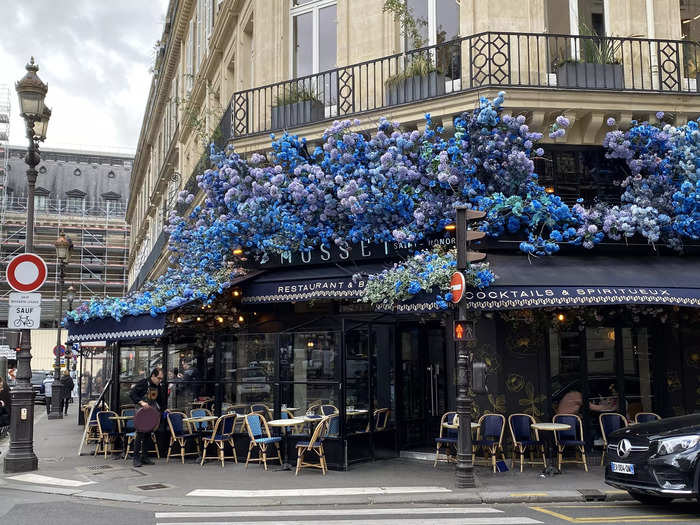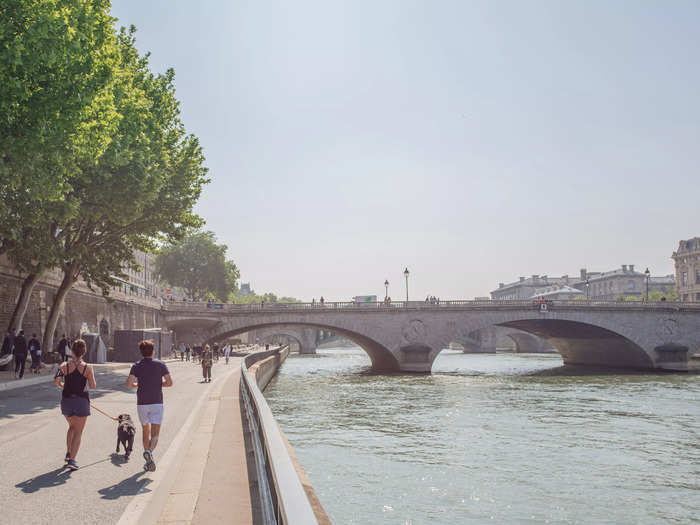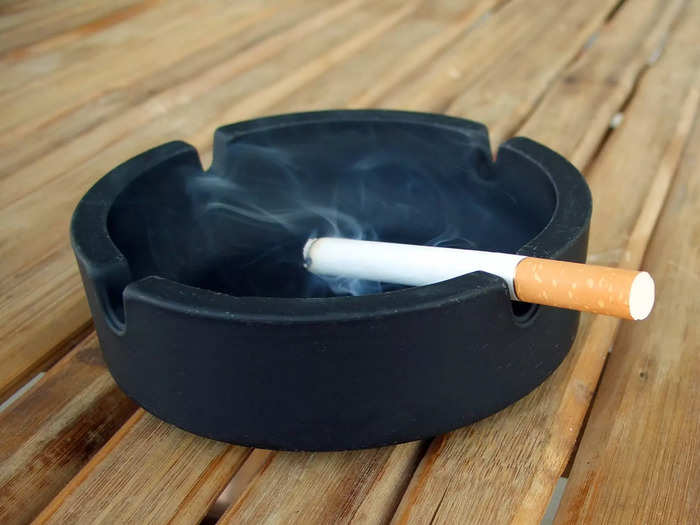I'm an American who's lived in Paris for years. These 8 things have really surprised me about living in the French capital.
Amanda Rollins

- I'm an American who's lived in Paris for more than five years.
- My time here has brought countless surprises, including affordable healthcare and very long lunches.
Shortly after I turned 25, I asked myself: "If you could live anywhere, where would it be?"
The answer was always Paris. Growing up in the US, I'd taken French classes from sixth grade through college. The language and the culture were always on my radar, so I decided to take the leap. Et voilà! Over five years later, my American cat and I are still in Paris full-time.
Here are eight things that have surprised me about life in the French capital.
Locals rarely wear athleisure, and their elevated style has inspired me to build my own capsule wardrobe.

In Paris, I rarely cross paths with people wearing sweatpants or leggings in public, which is a stark contrast to my experience in the US.
Most people in the French capital seem to put effort into their appearances and dress one step above what I'd consider casual in the US, even if they're making a quick run to the grocery store.
I see a lot of tailored trousers paired with plain sweaters and scarves. People also dress up jeans with loafers or crisp white sneakers and tailored jackets.
In the US, I had three fashion modes: going-out clothes (crop tops, jeans, and heels), athleisure (leggings, colored sneakers, and tank tops), and office attire (slacks, loafers, and silky blouses). On Saturdays, I was dressed for either the bars or the gym. There was really no in-between.
Living here has improved my sense of style and helped me take pride in how I present myself.
My new wardrobe consists of smart, simple pieces I can wear during the day and in the evening. I've developed a uniform of sorts, mixing trousers, jeans, white sneakers, silk maxi skirts, plain T-shirts, tailored jackets, and lots of black pieces.
Getting dressed is easier with a capsule wardrobe — I feel ready for anything when I leave the house.
In Paris, lunch can be a production that lasts two or more hours.

The first time I went to lunch with my colleagues in Paris, we stayed at the restaurant from noon until 2 p.m. Everyone ordered a three-course meal that included appetizers, entrées, desserts, and coffee.
In the US, I got used to grabbing a quick salad and inhaling it at my desk while working, so I had to adjust to this slower pace.
I quickly learned that long lunches filled with conversation are very common in Paris. As much as I appreciate this mindset, I'm not a big lunch person. So, I've started declining invites to avoid being there for hours at a time.
Gym culture doesn't seem as prominent in Paris as it does in some US cities.

When I was living stateside, it seemed I was always asked where I worked out, not whether I worked out. And I'd regularly go to the gym first thing in the morning.
Though new gyms and studios have cropped up in Paris in recent years, the fitness scene doesn't feel nearly as prominent here as it does in the US.
I joined a gym when I arrived purely out of habit, but I've since changed my routine. Now, I go on a leisurely jog along the Seine a few times a week instead.
Many Parisians I know walk a ton and lead active lifestyles, even if they aren't in the weight room at 6 a.m. Although I'm exercising less here in Paris, I've never felt healthier.
It's not a stereotype — many Parisians pick up a fresh baguette every single day.

Baguettes are a way of life here. Bread is a component of almost every meal and is meant to be eaten with the main courses, not beforehand as an appetizer like it is in the US.
Most baguettes in France contain just flour, water, yeast, and salt. There are no preservatives, meaning they can go stale in a short amount of time. It's not uncommon for people in Paris to buy a fresh baguette every day.
With boulangeries selling them for less than 2 euros a pop, who can blame them?
The legal drinking age is lower in France than it is in the US, and the culture surrounding alcohol feels different here.

The legal drinking age in France is 18, which could play into the mindset I've noticed surrounding alcohol here.
Drinking is part of France's culture, and based on what I've seen, the focus isn't on getting drunk the way it can be in the US, where people can't legally purchase or consume alcohol until they're 21. It's about socialization.
Of course, I've seen my fair share of locals overdo it since moving to Paris (and people's drinking habits vary the same way they do around the world), but jungle-juice parties, drinking games, and vodka-soaked watermelons don't seem to be as popular among people in their 20s here.
Inebriation feels like a byproduct of drinking in Paris rather than the purpose of it.
My pharmacist handwrites instructions on prescription boxes.

The first time I picked up a prescription in Paris, the pharmacist took a pen and wrote instructions on the box herself. I thought I was on an episode of "Punk'd."
My name and information weren't included on the box, and the only way I knew how much to take was by reading her handwritten cursive – which was in French and somewhat hard to read.
In the US, pill boxes tend to have all the relevant information — such as the patient's name, birth date, and dosage instructions — printed in giant letters.
People can smoke inside in a lot of Parisian nightclubs, and I've seen some light up inside house parties.

Before I moved to Paris, I was aware of the stereotype that French people are big smokers. I half expected it to be false (as so many clichés are), so I was surprised to find that cigarettes are actually very common here.
Walk down a busy street in Paris around noon, and you will pass dozens of Parisians smoking before lunch. Grab a seat at a café, and you will find an ashtray on the table. Have a drink with a friend on a terrace, and you may sit directly next to someone ready to pull out a cigarette.
Smoking is prohibited in enclosed public places, workplaces, and public parks, so I didn't expect so many nightclubs to have designated-smoking rooms inside. I've also noticed that it's completely normal for people to light up at crowded concerts.
I've seen plenty of locals smoke inside at house parties in Paris (usually by a window or in a bathroom, to be fair), which I rarely, if ever, saw happen in the US.
The smoking here put me off in the beginning — partly because I have asthma — but after nearly six years in Paris, it doesn't bother me as much anymore.
Because of France's social security, I spend significantly less on healthcare than I did in the US.

The most surprising thing about moving to Paris was the realization that healthcare costs significantly less here than it does in the US, where steep copays and premiums are par for the course. Of course, I knew about France's healthcare system before I relocated, but it was something altogether different to experience it firsthand.
The US has a mixed healthcare system that doesn't provide universal coverage, so it was quite the change to see France's social security, a government-funded healthcare system, cover every person who permanently resides in the country.
Everyone in France contributes to social security, so it isn't free, but the healthcare system reimburses most medical costs. Since moving to Paris, I've rarely paid out of pocket for doctor visits and medications. If I wanted to, I could also enroll in supplemental health insurance provided by private companies, which some people in France do.
I got sick in the winter of 2017 and begrudgingly went to the emergency room in Paris because I was having trouble breathing. If I were in the US, I probably would've avoided going at all costs because of how expensive hospital bills can be.
When I protested the physician's request for chest X-rays (a force of habit, as X-rays can cost thousands of dollars in the US), she responded by telling me that it would be covered by social security. That was the moment I understood what universal health coverage really meant.
Since I've moved to France, I always do the tests and see the specialists as soon as I have a health concern. Here, looking after my health is not a luxury I have to budget for.
This story was originally published on June 27, 2023, and most recently updated on February 15, 2024.
Popular Right Now
Popular Keywords
Advertisement